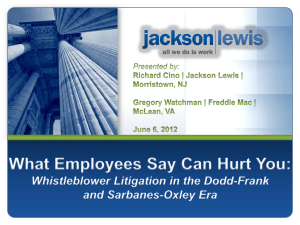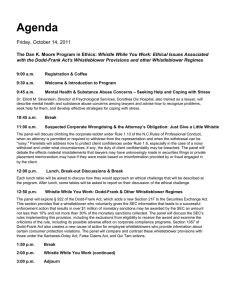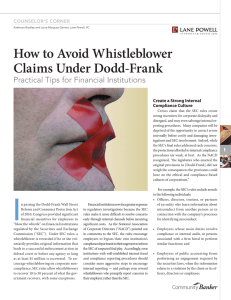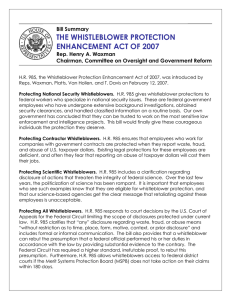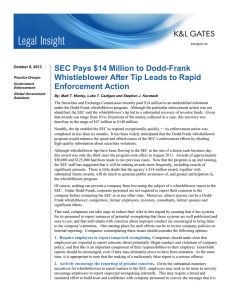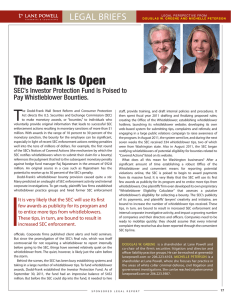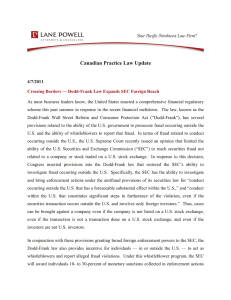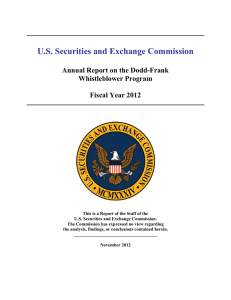SEC Receives More Than 300 Tips in First Program
advertisement
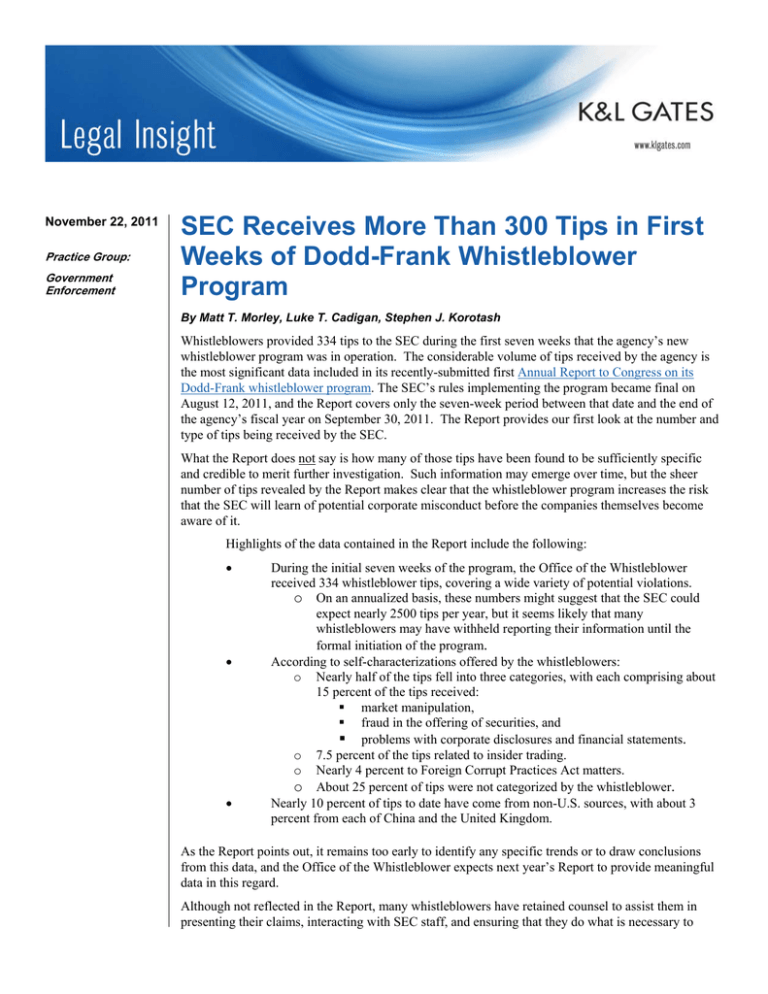
November 22, 2011 Practice Group: Government Enforcement SEC Receives More Than 300 Tips in First Weeks of Dodd-Frank Whistleblower Program By Matt T. Morley, Luke T. Cadigan, Stephen J. Korotash Whistleblowers provided 334 tips to the SEC during the first seven weeks that the agency’s new whistleblower program was in operation. The considerable volume of tips received by the agency is the most significant data included in its recently-submitted first Annual Report to Congress on its Dodd-Frank whistleblower program. The SEC’s rules implementing the program became final on August 12, 2011, and the Report covers only the seven-week period between that date and the end of the agency’s fiscal year on September 30, 2011. The Report provides our first look at the number and type of tips being received by the SEC. What the Report does not say is how many of those tips have been found to be sufficiently specific and credible to merit further investigation. Such information may emerge over time, but the sheer number of tips revealed by the Report makes clear that the whistleblower program increases the risk that the SEC will learn of potential corporate misconduct before the companies themselves become aware of it. Highlights of the data contained in the Report include the following: During the initial seven weeks of the program, the Office of the Whistleblower received 334 whistleblower tips, covering a wide variety of potential violations. o On an annualized basis, these numbers might suggest that the SEC could expect nearly 2500 tips per year, but it seems likely that many whistleblowers may have withheld reporting their information until the formal initiation of the program. According to self-characterizations offered by the whistleblowers: o Nearly half of the tips fell into three categories, with each comprising about 15 percent of the tips received: market manipulation, fraud in the offering of securities, and problems with corporate disclosures and financial statements. o 7.5 percent of the tips related to insider trading. o Nearly 4 percent to Foreign Corrupt Practices Act matters. o About 25 percent of tips were not categorized by the whistleblower. Nearly 10 percent of tips to date have come from non-U.S. sources, with about 3 percent from each of China and the United Kingdom. As the Report points out, it remains too early to identify any specific trends or to draw conclusions from this data, and the Office of the Whistleblower expects next year’s Report to provide meaningful data in this regard. Although not reflected in the Report, many whistleblowers have retained counsel to assist them in presenting their claims, interacting with SEC staff, and ensuring that they do what is necessary to SEC Receives More than 300 Tips in First Weeks of Dodd-Frank Whistleblower Program secure any bounties to which they may be entitled under the program. It seems likely that Enforcement Staff investigations arising from whistleblower complaints will receive a disproportionate amount of staff attention and resources, given the importance of the program, the SEC staff’s sensitivity to whistleblowers generally, and the active involvement of whistleblowers with a monetary interest in the success of the effort. These factors may also make such investigations, once initiated, more difficult for the staff to close. The Office of the Whistleblower, headed by Chief Sean McKessey and staffed by five attorneys and a senior paralegal, is engaged in a vigorous effort to publicize the program and to encourage potential whistleblowers to come forward. No payments have yet been made under the whistleblower program, and given the length of time involved in most enforcement investigations, it may be some time before the SEC makes its first bounty payment. It remains certain, however, that the SEC is keenly interested in hastening the payment of its first bounty – an event that will be sure to generate enormous publicity for the program, which in turn will bring about a renewed focus on whistleblower issues by corporate management and boards of directors. Of course, there is no way for a company to assure that it will not become the subject of a whistleblower report to the SEC. But a company can seek to minimize the risk of this occurring, by assuring that it has systems for its personnel to report instances of potential wrongdoing, that those systems are well publicized and easy to use, and that individuals with concerns about improper conduct are encouraged to bring them to the company’s attention. Dodd-Frank’s whistleblower provisions make it more likely that there will be significant consequences for companies that fail to implement effective internal reporting systems. If a company does not discover potential misconduct by its personnel, the chances are now very much increased that the SEC will uncover it. There is no simple formula for establishing an internal reporting process that employees will use as a first avenue to report concerns. Good policies and procedures are only a starting point. The more difficult task will be to create confidence among corporate personnel that concerns raised internally will receive a fair evaluation, and that those raising such concerns will not be risking their jobs in the process. For thoughts on how to address these issues, see our prior client alerts, How Can Employees Be Encouraged to Report Potential Misconduct to Their Employers? and What Companies Need to Know About the Dodd-Frank Whistleblower Rules. Authors: Matt T. Morley Luke T. Cadigan Stephen J. Korotash matt.morley@klgates.com +1. 202.778.9850 luke.cadigan@klgates.com +1. 617.2613118 steve.korotash@klgates.com +1. 214.939.5817 2 SEC Receives More than 300 Tips in First Weeks of Dodd-Frank Whistleblower Program 3
